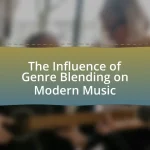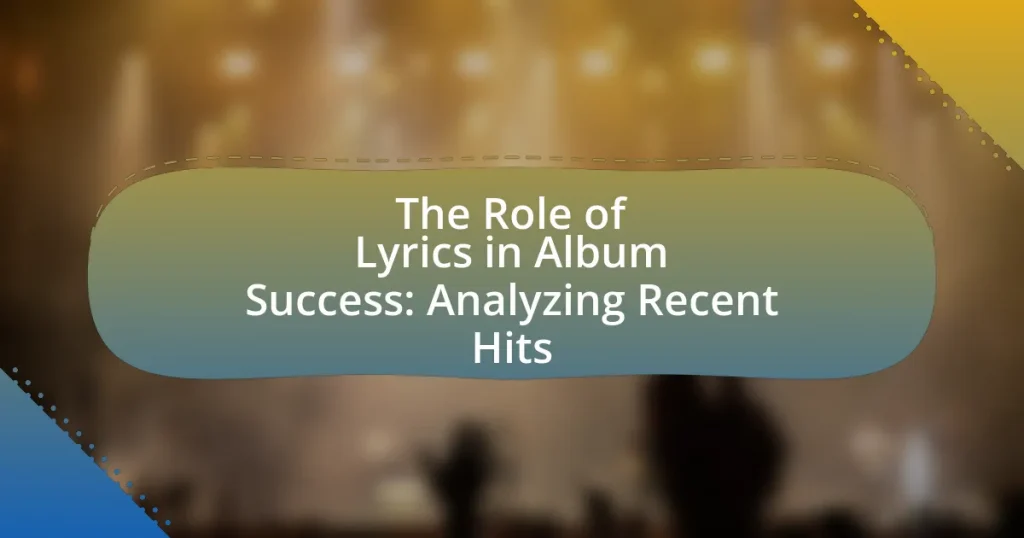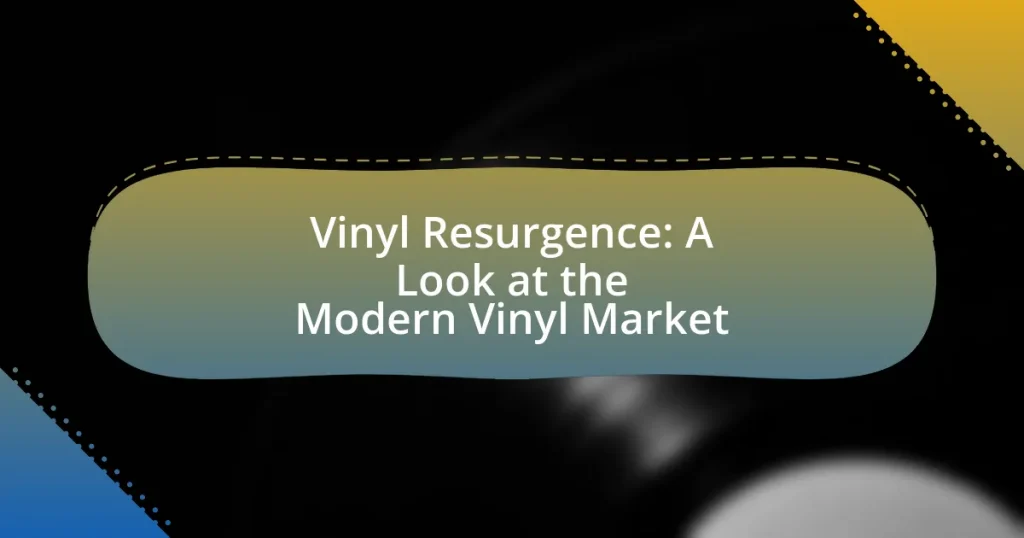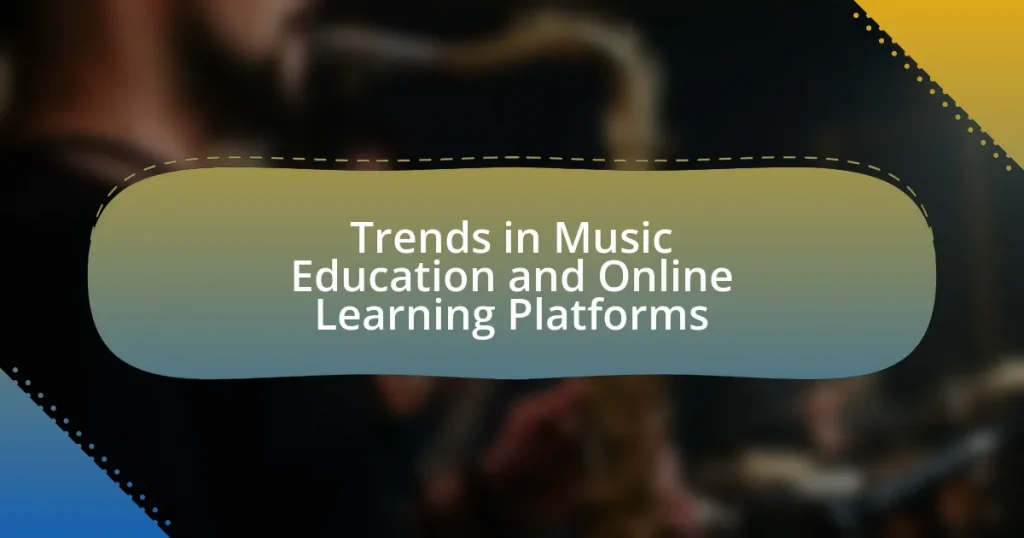The article examines the critical role of lyrics in the success of music albums, highlighting how engaging and relatable lyrics enhance emotional connections with listeners. It discusses the impact of lyrical content on listener engagement, marketing effectiveness, and an artist’s brand identity. Key elements such as storytelling, emotional resonance, and linguistic techniques are analyzed, along with examples of recent hits that exemplify these principles. The article also addresses common pitfalls in songwriting and offers insights into how artists can improve their lyrics for better commercial success.
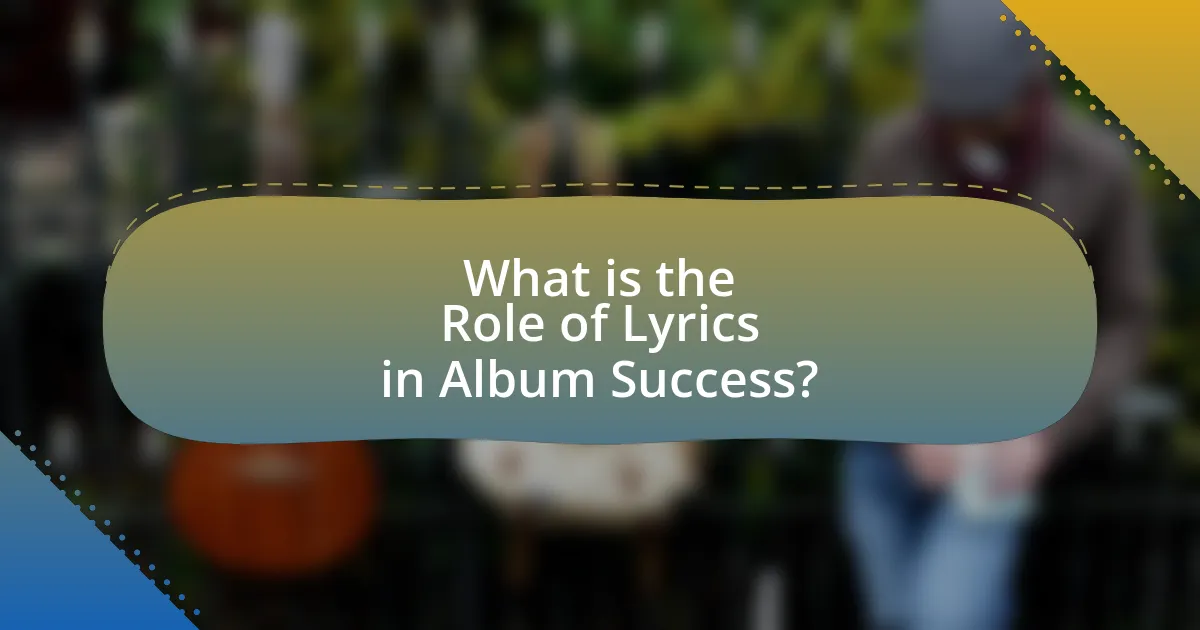
What is the Role of Lyrics in Album Success?
Lyrics play a crucial role in album success by enhancing emotional connection and relatability for listeners. Engaging and meaningful lyrics can resonate with audiences, leading to increased streaming, sales, and overall popularity. For instance, songs like “Someone Like You” by Adele, which features poignant lyrics about heartbreak, contributed significantly to her album’s commercial success, selling over 31 million copies worldwide. Additionally, research indicates that lyrics that tell a compelling story or convey strong emotions can lead to higher listener retention and sharing, further amplifying an album’s reach and impact.
How do lyrics influence listener engagement?
Lyrics significantly influence listener engagement by providing emotional resonance and relatability, which enhances the connection between the artist and the audience. When lyrics convey personal stories or universal themes, listeners often feel a deeper emotional investment in the music, leading to increased engagement. For instance, a study published in the Journal of Consumer Research found that songs with relatable lyrics can evoke stronger emotional responses, resulting in higher replay rates and social sharing. This demonstrates that well-crafted lyrics not only capture attention but also foster a lasting bond with listeners, ultimately contributing to the success of an album.
What elements of lyrics resonate most with audiences?
Emotional relatability is the primary element of lyrics that resonates most with audiences. Lyrics that evoke strong feelings or reflect personal experiences create a connection between the artist and the listener. For instance, studies show that songs addressing themes of love, heartbreak, and resilience often achieve higher chart success, as seen in hits like Adele’s “Someone Like You,” which topped charts globally due to its poignant storytelling and emotional depth. Additionally, the use of vivid imagery and relatable narratives enhances listener engagement, making the lyrics memorable and impactful.
How do lyrics contribute to the emotional connection with songs?
Lyrics contribute to the emotional connection with songs by conveying relatable themes and personal experiences that resonate with listeners. When lyrics articulate feelings of love, loss, or struggle, they create a shared emotional landscape that listeners can identify with, enhancing their connection to the music. Research indicates that songs with emotionally charged lyrics can evoke strong emotional responses; for example, a study published in the Journal of Personality and Social Psychology found that music with lyrics expressing sadness can lead to feelings of nostalgia and empathy in listeners. This emotional engagement is crucial for the success of songs, as it fosters a deeper bond between the artist and the audience, ultimately influencing the song’s popularity and impact.
Why are lyrics important in the music industry?
Lyrics are important in the music industry because they convey the emotional and narrative essence of a song, influencing listener engagement and connection. The lyrical content often reflects personal experiences, societal issues, or universal themes, which resonate with audiences and enhance the overall impact of the music. For instance, songs like “Fight Song” by Rachel Platten and “This Is Me” from The Greatest Showman have achieved commercial success partly due to their empowering and relatable lyrics, which have been shown to increase streaming and sales. Additionally, a study by Nielsen Music found that 70% of listeners consider lyrics to be a significant factor in their enjoyment of a song, highlighting their crucial role in driving album success and artist recognition.
How do lyrics impact marketing and promotion of albums?
Lyrics significantly impact the marketing and promotion of albums by enhancing emotional connection and relatability with audiences. When lyrics resonate with listeners, they create a deeper engagement, which can lead to increased sharing and word-of-mouth promotion. For instance, songs with relatable themes often perform better on social media platforms, driving organic reach and visibility. A study by Nielsen Music found that 70% of listeners are more likely to share a song if they connect with its lyrics, demonstrating the direct correlation between lyrical content and promotional effectiveness. Additionally, memorable lyrics can become catchphrases or hashtags, further amplifying marketing campaigns and creating a lasting brand identity for the album.
What role do lyrics play in defining an artist’s brand?
Lyrics play a crucial role in defining an artist’s brand by conveying their unique voice, themes, and emotional resonance. The content of lyrics often reflects the artist’s personal experiences, beliefs, and cultural influences, which helps to create a distinct identity that resonates with their audience. For example, artists like Taylor Swift and Kendrick Lamar have built their brands around storytelling and social commentary in their lyrics, which not only attract listeners but also foster a loyal fan base. This connection is supported by data showing that artists with relatable and authentic lyrics tend to achieve higher engagement and streaming numbers, as seen in the success of Swift’s “Folklore” and Lamar’s “DAMN.” These examples illustrate how lyrics serve as a foundational element in shaping an artist’s public persona and marketability.
What are the characteristics of successful lyrics in recent hits?
Successful lyrics in recent hits often feature relatability, emotional resonance, and catchy hooks. Relatable lyrics connect with listeners’ personal experiences, making them feel understood and engaged. Emotional resonance is achieved through storytelling and vivid imagery, which evoke strong feelings and memories. Catchy hooks enhance memorability, encouraging listeners to sing along and share the song. For instance, songs like “Drivers License” by Olivia Rodrigo exemplify these characteristics, as they tap into themes of heartbreak and nostalgia, resonating with a wide audience and achieving commercial success.
How do storytelling and themes enhance lyrical success?
Storytelling and themes enhance lyrical success by creating emotional connections and relatability for listeners. When lyrics incorporate compelling narratives and universal themes, they resonate more deeply, leading to increased engagement and memorability. For instance, songs like “The Night the Lights Went Out in Georgia” by Vicki Lawrence utilize storytelling to convey a dramatic tale, which captivates audiences and contributes to the song’s enduring popularity. Additionally, themes such as love, loss, and resilience are prevalent in successful tracks, as they reflect shared human experiences, making the lyrics more impactful and relatable. This connection often translates into higher streaming numbers and chart performance, demonstrating the direct correlation between effective storytelling, thematic depth, and lyrical success.
What linguistic techniques are commonly used in hit songs?
Common linguistic techniques used in hit songs include repetition, rhyme, metaphor, and imagery. Repetition enhances memorability and emotional impact, as seen in songs like “Rolling in the Deep” by Adele, where the chorus is repeated for emphasis. Rhyme creates a musical quality and aids in lyrical flow, evident in tracks like “Lose Yourself” by Eminem, which employs end rhymes to maintain rhythm. Metaphor allows for deeper meaning and connection, as demonstrated in “Firework” by Katy Perry, where the metaphor of a firework symbolizes self-empowerment. Imagery paints vivid pictures in the listener’s mind, as in “Shape of You” by Ed Sheeran, which uses descriptive language to evoke sensory experiences. These techniques contribute significantly to the emotional resonance and commercial success of songs.
How do lyrics compare across different music genres?
Lyrics vary significantly across different music genres, reflecting distinct themes, styles, and cultural contexts. For instance, hip-hop often emphasizes storytelling, social issues, and personal experiences, as seen in artists like Kendrick Lamar, whose lyrics address systemic racism and identity. In contrast, pop music frequently focuses on universal themes of love and relationships, exemplified by Taylor Swift’s catchy hooks and relatable narratives. Rock lyrics may explore rebellion and existential themes, as demonstrated by bands like Nirvana, which delve into angst and disillusionment. Country music typically highlights storytelling with a focus on everyday life and emotional experiences, as illustrated by artists like Chris Stapleton. These differences in lyrical content and style are shaped by the cultural and historical backgrounds of each genre, influencing how audiences connect with the music.
What unique lyrical trends are found in pop music?
Unique lyrical trends in pop music include the frequent use of personal storytelling, relatable themes, and conversational language. Personal storytelling allows artists to connect with listeners on an emotional level, as seen in songs like Taylor Swift’s “All Too Well,” which recounts vivid personal experiences. Relatable themes, such as love, heartbreak, and self-empowerment, dominate the genre, exemplified by Dua Lipa’s “Don’t Start Now,” which addresses moving on from a past relationship. Additionally, conversational language makes lyrics more accessible, as demonstrated in Billie Eilish’s “Bad Guy,” where informal phrasing creates a sense of intimacy. These trends contribute to the commercial success of pop albums by fostering listener engagement and emotional resonance.
How do lyrics in hip-hop differ from those in rock music?
Lyrics in hip-hop differ from those in rock music primarily in their focus on storytelling, social commentary, and rhythmic delivery. Hip-hop lyrics often emphasize personal experiences, cultural issues, and societal challenges, utilizing intricate wordplay and rhyme schemes to convey messages. For example, artists like Kendrick Lamar and J. Cole frequently address themes of racial inequality and personal struggle, which are central to their narratives. In contrast, rock lyrics typically explore themes of love, rebellion, and existential angst, often employing metaphorical language and a more straightforward lyrical structure. Bands like Nirvana and U2 illustrate this with their focus on emotional expression and introspection. The distinct approaches to lyricism in these genres reflect their cultural origins and the different ways artists connect with their audiences.
What recent hits exemplify the importance of lyrics in album success?
Recent hits that exemplify the importance of lyrics in album success include “Drivers License” by Olivia Rodrigo and “All Too Well (10 Minute Version)” by Taylor Swift. Both songs achieved commercial success and critical acclaim largely due to their emotionally resonant and narrative-driven lyrics. “Drivers License” topped charts globally, breaking Spotify streaming records, while “All Too Well” was praised for its storytelling depth, leading to significant album sales and streaming numbers. These examples demonstrate how impactful lyrics can drive listener engagement and contribute to overall album success.
How have specific songs achieved commercial success through their lyrics?
Specific songs have achieved commercial success through their lyrics by resonating with listeners’ emotions and experiences, often addressing relatable themes such as love, heartbreak, and empowerment. For example, “Someone Like You” by Adele topped charts globally, largely due to its poignant lyrics that evoke feelings of nostalgia and loss, contributing to its sales of over 31 million copies worldwide. Similarly, “Shake It Off” by Taylor Swift became a commercial hit by promoting a message of resilience and self-acceptance, leading to over 10 million copies sold in the U.S. alone. These examples illustrate how impactful and relatable lyrics can drive a song’s popularity and commercial success.
What critical acclaim have recent albums received based on their lyrical content?
Recent albums have received significant critical acclaim for their lyrical content, often praised for their depth, storytelling, and emotional resonance. For instance, Taylor Swift’s “Folklore” and “Evermore” have been lauded for their narrative-driven lyrics, with critics highlighting their introspective themes and vivid imagery, as noted in reviews from publications like Pitchfork and Rolling Stone. Similarly, Kendrick Lamar’s “Mr. Morale & The Big Steppers” has been recognized for its complex exploration of personal and societal issues, earning accolades from sources such as Metacritic and The Guardian for its thought-provoking lyrics. These examples illustrate how recent albums have garnered attention and respect in the music industry primarily due to their impactful lyrical content.
How can artists improve their lyrics for better album success?
Artists can improve their lyrics for better album success by focusing on authenticity, storytelling, and emotional resonance. Authenticity ensures that the lyrics reflect the artist’s true experiences and feelings, which can create a deeper connection with listeners. Storytelling engages the audience by weaving narratives that captivate and maintain interest throughout the song. Emotional resonance allows listeners to relate to the themes and messages, enhancing their overall experience. Research indicates that songs with relatable themes and strong narratives tend to perform better on charts, as seen in the success of artists like Taylor Swift and Ed Sheeran, who often incorporate personal stories and emotions into their lyrics.
What techniques can songwriters use to enhance lyrical quality?
Songwriters can enhance lyrical quality by employing techniques such as imagery, metaphor, and storytelling. Imagery allows songwriters to create vivid pictures in the listener’s mind, making the lyrics more relatable and impactful. For example, using descriptive language can evoke emotions and set a scene, which is evident in songs like “Firework” by Katy Perry, where visual imagery plays a crucial role in conveying the song’s message.
Metaphor adds depth and complexity to lyrics, enabling songwriters to express abstract ideas in a more tangible way. A notable instance is Bob Dylan’s use of metaphor in “Blowin’ in the Wind,” where he addresses profound social issues through symbolic language.
Storytelling engages listeners by weaving narratives that resonate on a personal level. This technique is effectively utilized in Taylor Swift’s “The Last Great American Dynasty,” where she narrates a historical tale that connects with contemporary themes.
These techniques not only enhance lyrical quality but also contribute to the overall success of songs, as evidenced by their frequent use in chart-topping hits.
How can collaboration with other writers improve lyrical depth?
Collaboration with other writers can significantly enhance lyrical depth by introducing diverse perspectives and experiences. When multiple writers contribute, they bring unique styles, themes, and emotional insights, which can lead to more complex and layered lyrics. For instance, the collaboration between artists like Jay-Z and Kanye West on the album “Watch the Throne” resulted in intricate storytelling and varied lyrical content that resonated with a broader audience. This blending of ideas not only enriches the lyrical narrative but also fosters creativity, allowing for innovative expressions that might not emerge in solo writing.
What are the common pitfalls to avoid in songwriting?
Common pitfalls to avoid in songwriting include lack of originality, overcomplicating lyrics, and neglecting song structure. Lack of originality can lead to songs that sound too similar to existing works, which may fail to engage listeners. Overcomplicating lyrics can obscure the message, making it difficult for audiences to connect emotionally. Neglecting song structure can result in a disorganized flow, causing listeners to lose interest. These pitfalls can hinder a song’s potential success, as evidenced by the importance of memorable hooks and clear narratives in popular hits.
How can clichés undermine the effectiveness of lyrics?
Clichés can undermine the effectiveness of lyrics by making them predictable and unoriginal, which diminishes emotional impact. When lyrics rely on overused phrases or ideas, they fail to resonate with listeners who seek authenticity and innovation in music. For example, a study by the University of Southern California found that songs with unique lyrical content tend to achieve higher chart success compared to those filled with clichés. This indicates that originality in lyrics is crucial for connecting with audiences and enhancing the overall appeal of a song.
What mistakes do new artists often make with their lyrics?
New artists often make the mistake of prioritizing style over substance in their lyrics. This can lead to vague or clichéd expressions that fail to resonate with listeners. For instance, many new artists rely on generic themes of love or heartbreak without adding personal or unique perspectives, which can result in lyrics that lack emotional depth. Additionally, new artists frequently overlook the importance of storytelling, leading to disjointed narratives that confuse rather than engage the audience. Research indicates that songs with strong narratives tend to perform better on charts, highlighting the significance of cohesive storytelling in successful lyrics.








